May 20, 2025 | 16:44 GMT +7
May 20, 2025 | 16:44 GMT +7
Hotline: 0913.378.918
May 20, 2025 | 16:44 GMT +7
Hotline: 0913.378.918
Apiculture flourishes in Nghe An's mountainous regions, where the afforestation movement is gaining strength. The acacia forests along the Ho Chi Minh highway that passes through Thanh Chuong, Anh Son, Tan Ky, Nghia Dan, etc. are suitable for beekeeping. Each district has an average of 50 to 70 honeybee farms with between 150 and 600 colonies.
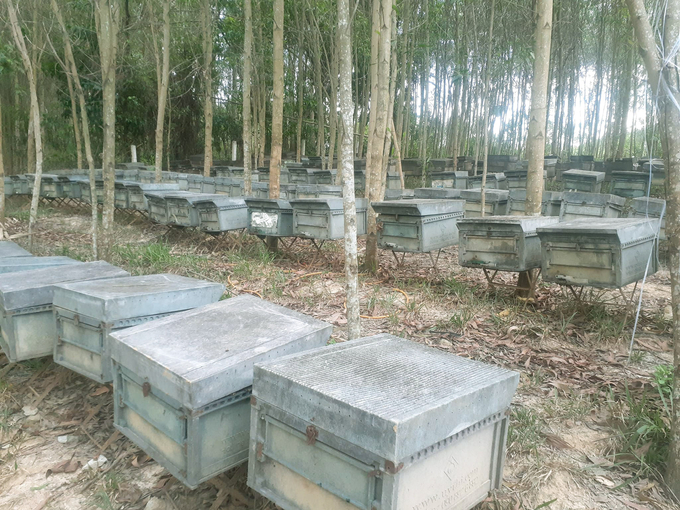
Nghe An with spiky acacia hills has created favorable conditions to attract farm beekeeping. Photo: Huy Thu.
There are no detailed reports, but the majority of honeybee colonies are owned by expatriates. Among others, they migrated from Gia Lai, Dak Lak, Ninh Binh, Thai Binh, and Hai Duong. Transporting honeybees from other locations to Nghe An for rearing has become a crucial link in the extraordinary exodus voyage of honeybee cultivation across the nation.
Facilities for the rearing of migratory honeybees primarily cultivate Italian bees, which are adapted to the environment, have robust development, are resistant to disease, produce two to three times more honey than the local bees, and produce honey of superior quality. Once every seven to ten days, honey is extracted from the frames. Good crates of honeybees can produce approximately 100 kg of honey per harvest.
According to some honeybee colonies, the weather this year has been favorable for honey production. Lengthy sunny conditions result in a substantial increase in the number of bee colonies and concentrated acacia honey is simple for bees to collect. During sweltering days, honeybee farms harvest honey proactively. The honey harvest typically lasts from March to December, with the first months of the harvest producing the highest quality honey.
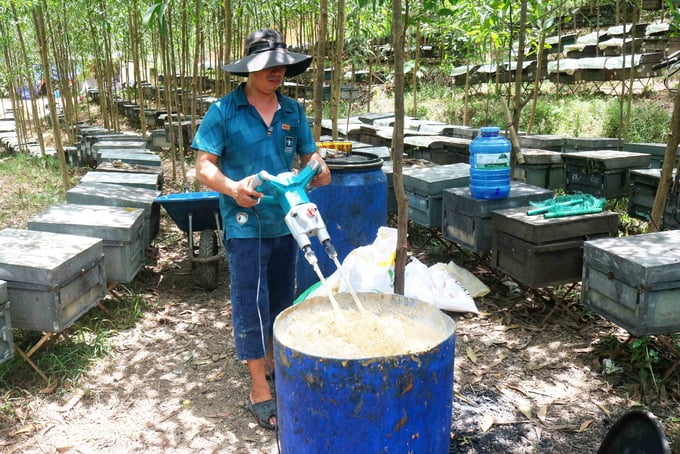
The price of honey is too low, while the costs of investment, bee care, and transportation are high, causing many bee farms to quit or suffer losses. Photo: Huy Thu.
Vu Van Duy, age 41, is an experienced honeybee breeder from Hai Duong who owns a property in Duc Son commune, Anh Son district. This year, he took advantage of the lychee crop in Thanh Ha (Hai Duong) and transported the honeybees from Hai Duong to Nghe An in early April, as Nghe An has a number of acacia forests that are suitable for apiculture and the honey supply appears stable at that time.
In the Duc Son commune of the Anh Son district are approximately ten honeybee colonies. Each harvest at Duy's facility produces between 1.3 and 2 tons of honey from approximately 600 colonies of bees that have been cultivated for years. "This year's harvest is bountiful, but the price of honey is so low that a kilogram of honey cannot even be exchanged for a loaf of bread. As a result, farmers cannot earn a profit and may even incur a loss; the more they farm, the greater their losses," lamented Duy.
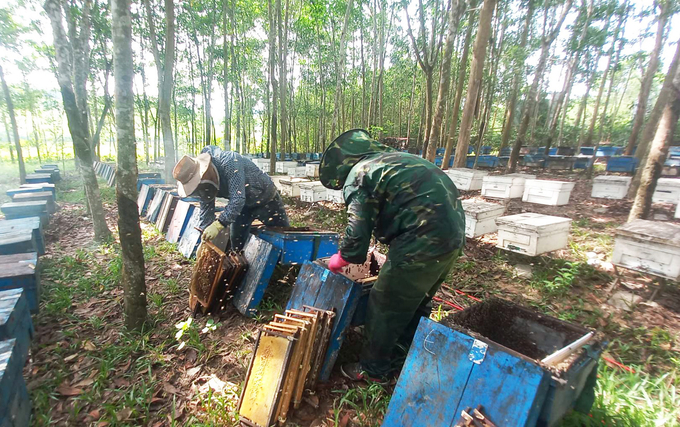
Harvesting honey in Nghia Dan district (Nghe An). Photo: Huy Thu.
Prices vary based on the honey's quality. Bright yellow honey varieties with a moderate flavor are more valuable than dark honey. People who purchase honey frequently bring along a light meter, hydrometer, etc. Typically, they analyze a small sample of honey and establish a price on the spot. The greater the honey's depreciation, the darker its color.
Beginning in 2022, the price per kilogram of honey fluctuates between 20,000 and 21,000 VND. Last year at this time, the price of honey was between 16,000 and 17,000 VND per kilogram. However, honey purchased from bee farms in Nghe An is currently priced between 8,000 and 9,000 VND per kilogram, and even poor-quality honey can be sold for around 7,000 VND per kilogram.
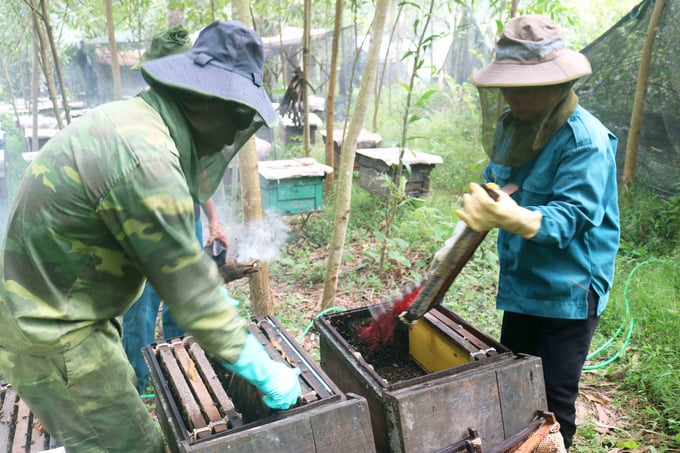
Never before has the price of honey (farmed foreign species) been cheaper than it is now. Photo: Huy Thu.
Despite the low price, honeybee producers are compelled to sell their products; honey must be sold immediately after being extracted from frames because it can be disqualified without proper preservation, resulting in a price reduction.
The majority of beekeepers on farms in Nghe An with foreign bee varieties appear to have only one sales channel, which is selling to procuring establishments. They have not explored any other sales channels, so the price of honey is entirely dependent on them.
Moving the bee farm to coincide with the flowering seasons is costly. Mr. Phung Van Van, who raises bees in Thanh Son commune (Thanh Chuong district), stated that each beekeeping establishment has at least two prime locations that are leased seasonally (approximately 2 to 3 million VND per crop) throughout the entire year. Seasonal rotation between the South and outside the North. In the winter, beekeepers are relocated from the north to the south. Spring's warmth attracts pollinators from the south to the north.
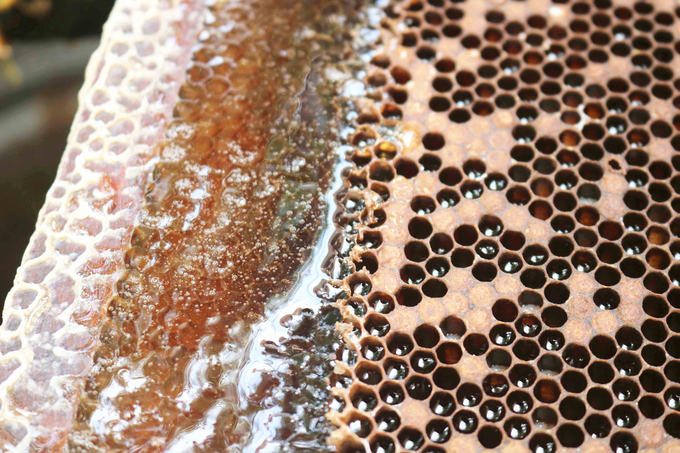
The heavy old honey bridges have not been harvested for a long time because the price of honey is too cheap. Photo: Huy Thu.
Typically, honey beekeeping operations spend 5 months in the South and 7 months in the North each year. As for Mr. Van, he frequently selects Gia Lai and Nghe An as his destination, both historically and currently. When the coffee season in the Central Highlands concludes, he will bring bees to Nghe An to usher in the acacia honey season, establishing a base in the extensive acacia forests. The acacia blossoms produce less honey in the winter, so he returned the bees to the Central Highlands.
In recent years, the global honey market has become increasingly competitive. Countries that import honey use trade remedies to increase the technical barriers to this product. Not only is this a significant obstacle for honey exporters, but it also has a significant impact on the livelihoods of beekeepers throughout the country, including those in Nghe An. According to beekeepers, honey prices plummeted because they were unable to be exported to foreign countries, particularly the U.S. market. As a result, there was a significant surplus, which prompted domestic honey companies to import at low prices.
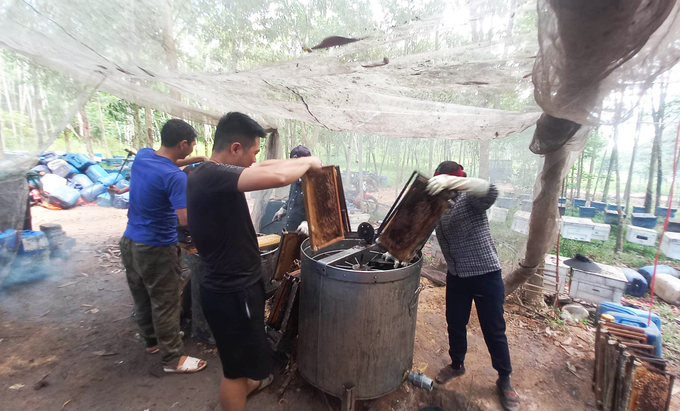
On average, in the middle of the honey season, about 7-10 days, the bee farms will rotate once. Now the price of honey has dropped dramatically, so many bee farms in Nghe An have stopped harvesting honey. Photo: Huy Thu.
Mr. Le Van Luan (24 years old) from Thanh Huong commune (Thanh Chuong) is procuring honey for a honey company in Dak Lak. He stated that there are four purchasing establishments in the Thanh Chuong district. His facility purchases honey from all of the districts in Nghe An and Ha Tinh for an average of 8,000 to 10,000 VND per kilogram.
The establishment's honey price is determined by the "parent company" in Dak Lak. Because the price of honey has dropped significantly over the past month, many bee farms no longer process honey for sale, so Luan's establishment cannot purchase products. The majority of the area's retail establishments also sit and drink water, the vehicle ceases running, the box is not...
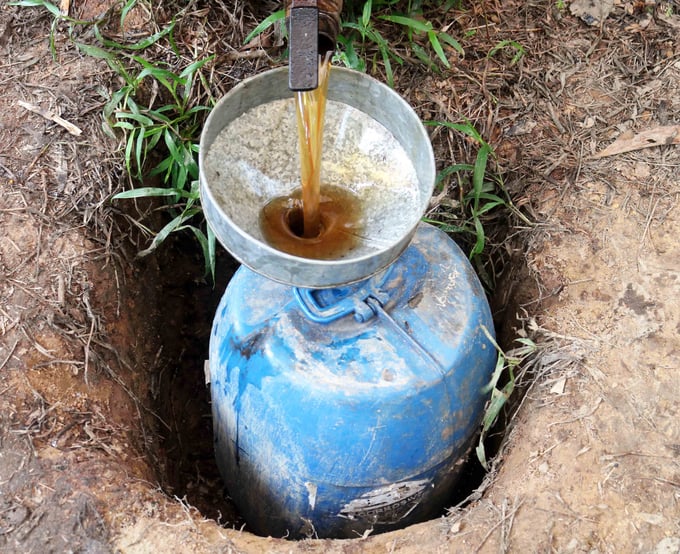
On average, each box of bees gives a few honey nests/season, a good barrel can contain up to 100kg. Photo: Huy Thu.
The price of honey is so low that beekeepers are reluctant to sell it to establishments that purchase it. A portion of the honey produced by many farms is used to sustain pollinators, while the remainder is stored in anticipation of a price increase. Recently, a large number of producers have discontinued selling honey.
However, not every farm has the necessary equipment and space to store significant quantities of honey. Moreover, if there is no proper method for storing honey, it will change color, become acidic, lose quality, and eventually perish. Consequently, they were ultimately compelled to liquidate, even though they knew the sale would result in a loss.
They also raise bees on the estate, but local beekeepers in Nghe An (mostly residents) have maintained their own sales channels for quite some time. They do not sell to wholesalers at the price "1 kilogram of honey cannot be exchanged for 1 liter of water," but rather for domestic consumption and retail to consumers.

The purchasing establishments often take honey samples, and check the color, and sugar level to determine the price of honey. The darker the honey color, the more depreciated. Photo: Huy Thu.
Mr. Nguyen Ngoc Tu (38 years old) - a beekeeper in the Vo Liet commune (Thanh Chuong) - stated that he raises nearly 300 flocks and distributes them to a large number of people's homes; each family has approximately 30-40 flocks. Local beekeepers such as he develops their own consumer market. Every season, he also sells all the honey he can obtain for 13 to 20 times the price of honey produced by foreign beekeepers (130,000 to 180,000 VND per 650ml container).
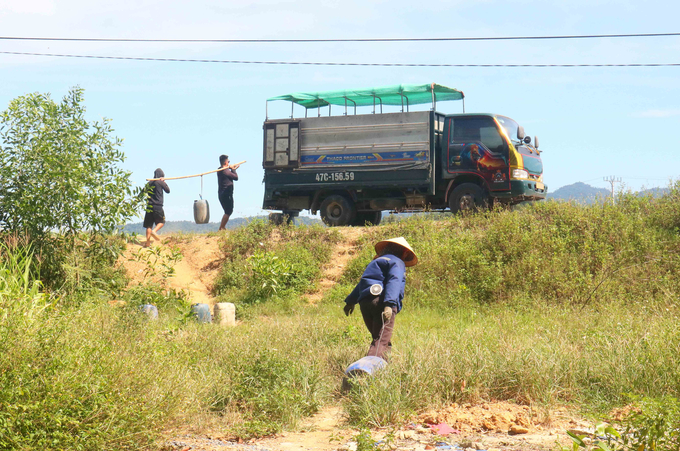
Transporting honey in the mountains is quite difficult. Photo: Huy Thu.
Perhaps due to this tendency, the same beekeeping vocation exists on the farm, but foreign beekeeping is struggling, creating a conundrum for domestic beekeepers, who continue to develop steadily on the small market. The price of honey plummeted, forcing many foreign beekeepers in Nghe An and other provinces to liquidate their bee colonies because they were unable to maintain their capital.
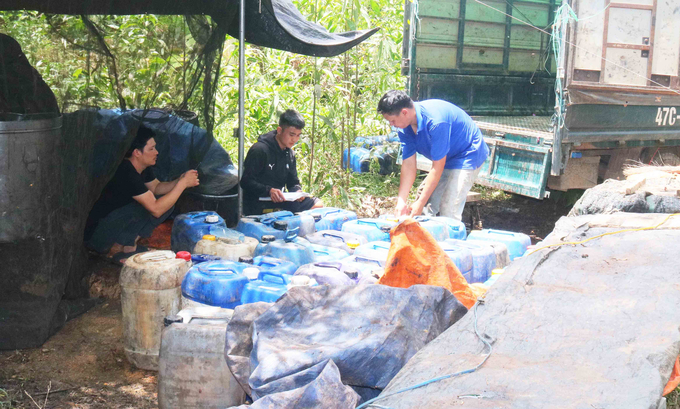
The price of farm honey (foreign bee species) in Nghe An is currently only fluctuating from 8,000 - 9,000 VND/kg, the more you raise the more losses. Photo: Huy Thu.
Currently, many individuals sell bees, but it is difficult to sell hundreds of bee colonies at low prices. Never before has farm beekeeping that sells honey to businesses been in such a precarious position.
Translated by Linh Linh
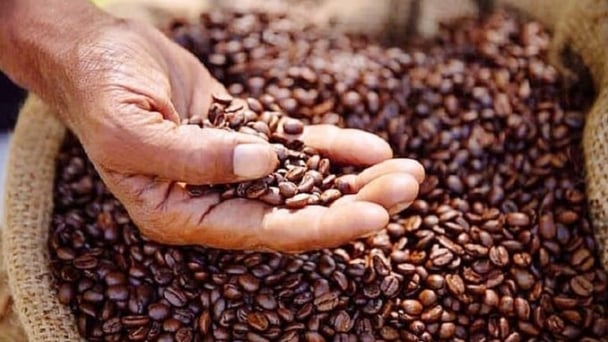
(VAN) Coffee prices on May 20, 2025, surged by VND 2,200, climbing to VND 126,000 – 126,700/kg. Meanwhile, global coffee prices also recorded a sharp increase.
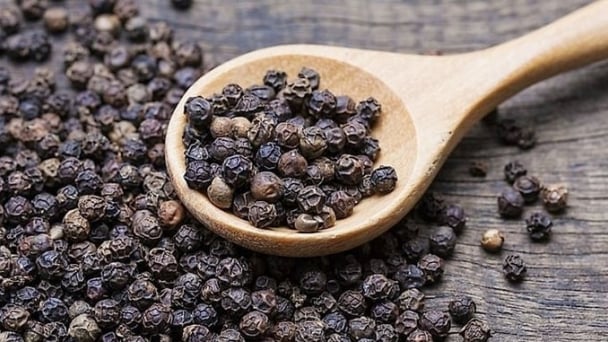
(VAN) Pepper prices on May 20, 2025, dropped by VND 1,000 only in Gia Lai, trading at VND 150,000 – 153,000/kg. Global pepper prices remained unchanged.
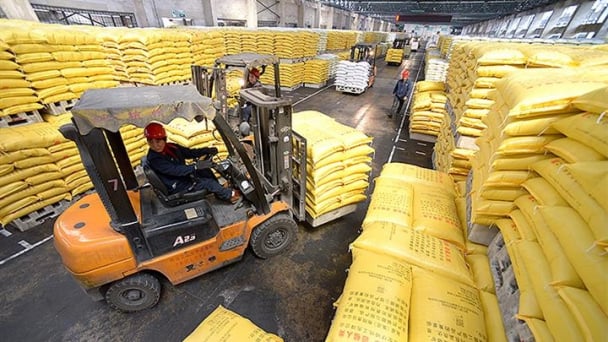
(VAN) Analysts are watching moves out of Asia, particularly with fertilizer.
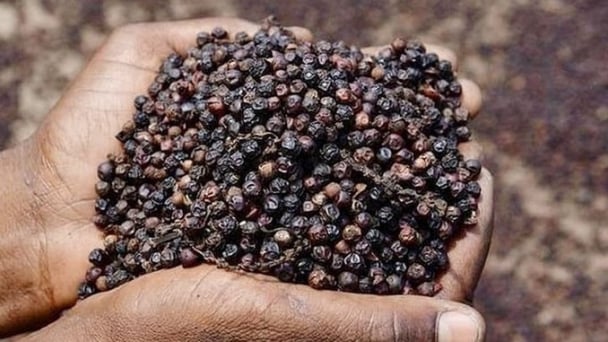
(VAN) Pepper prices on May 16, 2025, fluctuated by VND 500–1,000 domestically, trading at VND 151,000 – 152,000/kg. Global pepper prices remained stable.
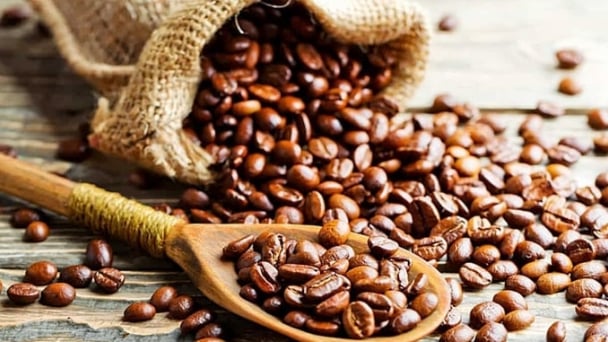
(VAN) Coffee prices on May 16, 2025, edged up by VND 200, trading around VND 125,900 – 126,200/kg. Meanwhile, global coffee prices are showing mixed movements.
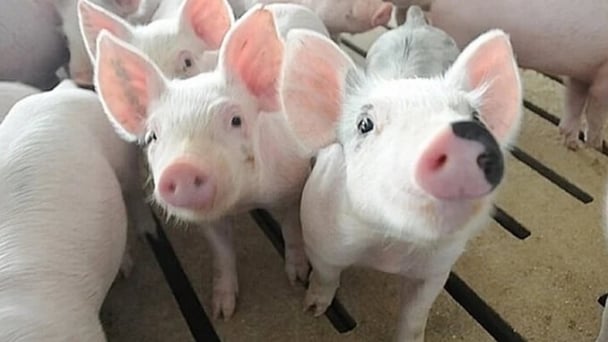
(VAN) Live pig prices on May 16, 2025, continue to remain flat. Live pig prices across the 3 regions are trading in the range of VND 67,000 to VND 75,000/kg.
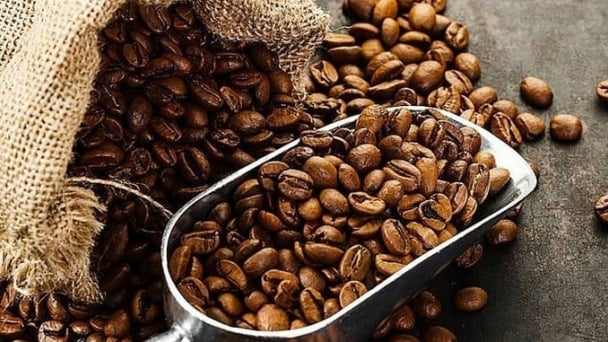
(VAN) Coffee prices on May 15, 2025, fell sharply by VND 2,500, trading at VND 125,700 – 126,200/kg. Global coffee prices also dropped significantly by 3%.